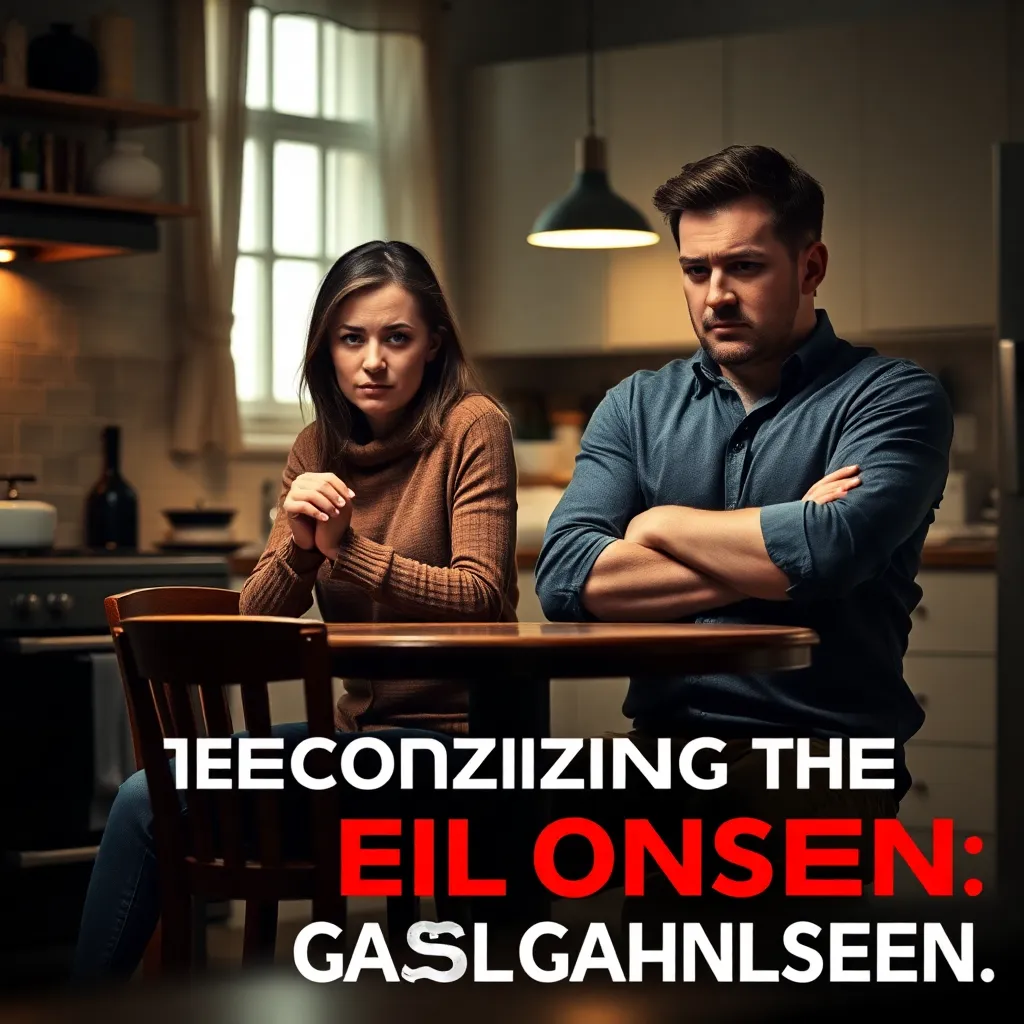Navigating the complexities of relationships can sometimes feel like walking through a maze, especially when subtle manipulations are at play. If you’ve ever found yourself doubting your own perceptions or questioning your reality, you might be experiencing gaslighting—a form of emotional abuse that can leave deep, invisible scars. Recognizing the signs of gaslighting is crucial, as it can erode your confidence and sense of self-worth over time. By understanding this insidious tactic, you can take the first steps toward reclaiming your voice and power.
Gaslighting isn’t just a trendy buzzword; it’s a very real psychological manipulation that can happen in any type of relationship, from romantic partnerships to professional environments. Its effects can be devastating, often leaving victims feeling isolated and confused. In this article, we will delve into the origins and mechanics of gaslighting, shedding light on why it happens and how it manifests. You’ll learn to identify the subtle signs that may indicate you’re being gaslit and discover effective strategies to protect yourself.
Arming yourself with knowledge about gaslighting can empower you to break free from its grip and foster healthier, more authentic connections. We’ll guide you through practical steps to rebuild your confidence and establish boundaries, helping you navigate relationships with clarity and strength. Your journey to understanding and overcoming gaslighting starts here, and together, we will explore the tools you need to create a more honest and supportive environment for yourself. Whether you’re seeking to understand your own experiences or support someone else, this article aims to be a beacon of hope and guidance.
1. Defining Gaslighting in Relationships

Gaslighting is a form of psychological manipulation where a person tries to make their partner doubt their own reality. In relationships, it often involves one partner consistently twisting the truth, leaving the other feeling confused and insecure.
Imagine a scenario where your partner insists you said something you know you didn’t. Over time, this can erode your self-trust and make you question your own memory and perceptions.
Experts agree that gaslighting often starts subtly and can escalate into a more damaging pattern of behavior. Dr. Mia Thompson, a licensed psychologist, notes, “Identifying gaslighting early can help safeguard your mental well-being.”
To protect yourself, maintain a journal of events and conversations to keep a clear record. This can help you stay grounded and provide a reference when you feel uncertain about what truly happened.
2. Recognizing Gaslighting Behaviors

Recognizing when you are being gaslighted can be challenging, as these behaviors often start subtly. For instance, you might find your partner frequently dismissing your emotions by saying you’re being ‘overly sensitive’ or ‘imagining things.’ Such comments can leave you doubting your own perception of reality, which is a core component of gaslighting. It’s essential to trust your feelings and understand that your emotions are valid.
Often, gaslighters will twist the narrative to make themselves appear blameless. For example, if you confront them about something hurtful they said, they might insist, “I never said that,” or “You’re misremembering.” This tactic of denying or altering facts can make you question your memory. Remember, consistency in your partner’s story and your recollections is crucial in identifying this manipulative behavior.
Gaslighters may also use isolation to control their partners subtly. They might discourage you from seeing friends or family, making you feel dependent on them for support. This isolation limits your perspective and makes it harder to recognize unhealthy behaviors. It’s vital to maintain your support networks and seek outside perspectives to ensure your experiences are acknowledged and validated.
Ending a section on a practical note, it’s crucial to empower yourself with knowledge and support. Understanding the signs of gaslighting helps regain control over your reality and emotional well-being. By trusting your instincts and seeking guidance, you can build a healthier and more supportive relationship environment.
3. Psychological Impact of Gaslighting

Gaslighting can have a profound psychological impact on individuals, often leaving them in a state of confusion and self-doubt. Over time, these feelings can erode a person’s self-esteem, making them question their own reality and judgment.
In relationships, victims of gaslighting might find themselves constantly apologizing and feeling responsible for issues that are not their fault. This emotional manipulation can lead to a cycle of anxiety and depression, as the person struggles to regain a sense of control over their life.
Consider a scenario where one partner frequently dismisses the other’s feelings or concerns, labeling them as ‘silly’ or ‘overreacting.’ Such behavior can gradually undermine the victim’s confidence and make them hesitant to express their thoughts in the future.
Experts suggest that open communication and setting boundaries are crucial in mitigating the effects of gaslighting. Seeking support from trusted friends or mental health professionals can also provide the necessary guidance to rebuild one’s sense of self.
The key takeaway from understanding the psychological impact of gaslighting is the importance of recognizing the signs early on. By doing so, individuals can take proactive steps to protect their mental well-being and maintain healthy, balanced relationships.
4. Responding to Gaslighting Tactics

When faced with gaslighting tactics, it’s important to first recognize the signs and understand that you are not alone. Trust your instincts and remember that your perception of reality is valid, despite what you might be told.
In real-world scenarios, a partner might dismiss your feelings by saying, “You’re overreacting.” It’s crucial to stay grounded and seek validation from trusted friends or mental health professionals who can provide an outside perspective.
One effective strategy is to set clear boundaries. Firmly stating, “I will not continue this conversation if you keep dismissing my feelings,” can help you establish a line that protects your emotional well-being. Remember, asserting boundaries is a sign of strength, not aggression.
Experts suggest keeping a journal to document incidents of gaslighting. This can serve as both a therapeutic outlet and a tangible record to help you see patterns and validate your experiences over time.
As you navigate these challenges, lean on supportive relationships that reinforce your sense of reality and self-worth. Building a network of allies can make a significant difference and affirm that you deserve to be treated with respect and honesty.
5. Recovering from Gaslighting Trauma

Recovering from the trauma of gaslighting is a journey that requires both time and patience. Acknowledging that you have been manipulated is the first step towards regaining your sense of self. It’s not uncommon to feel a mix of emotions such as anger, confusion, and sadness as you process your experiences. During this phase, consider seeking support from a therapist who specializes in emotional abuse to help navigate these complex feelings.
Rebuilding your self-esteem is crucial after enduring gaslighting. Start by reaffirming your reality and trusting in your own perceptions once more. Engage in activities that ground you, such as journaling or meditation, which can help reconnect with your inner voice. These practices allow you to gradually rebuild trust in yourself, which is essential for healing.
Surrounding yourself with a supportive network can significantly aid in your recovery process. Communicate with friends or family who understand your situation and can offer validation and encouragement. As you share your story, you might find that others have gone through similar experiences, providing a sense of solidarity and hope.
Finally, remember that healing from gaslighting is not linear, and setbacks are a normal part of the process. Be gentle with yourself and celebrate small victories along the way. With time and effort, you can rebuild your confidence and reclaim your narrative, leading to healthier, more authentic relationships.
Conclusion: Creating Beautiful Outdoor Spaces
Understanding gaslighting is crucial for nurturing healthy relationships. In this article, we explored five key concepts: recognizing the subtle signs of gaslighting, understanding the psychological impact on victims, distinguishing between gaslighting and genuine disagreements, developing communication strategies to counter gaslighting, and fostering supportive environments to promote trust and openness.
As a next step, take a moment to reflect on your own relationships. Identify any patterns that may indicate gaslighting, and start a conversation with a trusted friend or therapist to gain perspective. Remember, awareness is the first step toward change.
Bookmark this article as your go-to guide in navigating the complexities of gaslighting. It’s a valuable resource to revisit when you need clarity or support in maintaining healthy, respectful relationships.
Looking forward, armed with this knowledge, you are better equipped to foster relationships built on mutual respect and understanding. By addressing and eliminating gaslighting behaviors, you pave the way for deeper connections and lasting relationship success. Empower yourself to take action today, and remember that every step you take brings you closer to a more fulfilling relationship journey.
